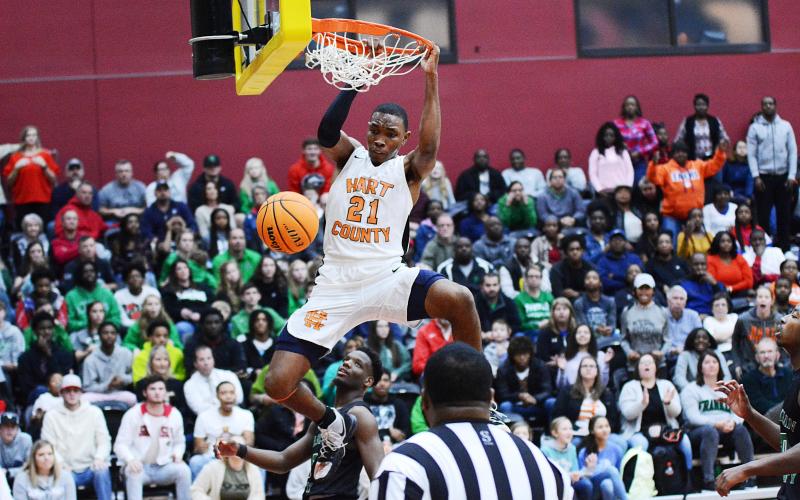High school hoopsters will soon be faced with a 30-second shot clock ticking down on offense, similar to college and professional basketball games, and local coaches are having mixed reactions to the change.
The Georgia High School Association approved last week a three-year phasing in of shot clocks into varsity high school games starting with the 2020-2021 season.
In the first year, shot clocks would only be used for approved holiday tournaments or showcase games. The shot clock would not be allowed in region or postseason games.
The next year, regions could vote to use the shot clock in region play and the shot clocks could also be used in approved tournaments and showcase games.
In the third year, shot clocks will be implemented in all varsity games including the state playoffs.
The GHSA executive committee overwhelmingly approved the motion 53-10.
Hart County High School head girls basketball coach Mike Edwards said the change won’t effect his squad all that much. He said he’s not against it, but he doesn’t think it will revolutionize the game like many enthusiasts have speculated.
“I see why they’re doing it, to make it more college-like,” Edwards said. “But I don’t think it’s going to have any effect on us. If we have the ball more than 30 seconds, we’re going to turn it over anyway.”
Edwards said he could see the change effecting end-ofquarter and end-of-game scenarios where a team with the lead couldn’t hold the ball for more than 30 seconds as the clock is winding.
What rule changes, like whether or not there is still a five-second count, come along with the shot clock will be important too, Edwards said.
The rule change benefits some of the powerhouse teams, Edwards said, because the shot clock will take away a lot of upsets.
“You can’t have a team come in and be very deliberate, hold the ball, try to say ‘alright lets get it to the fourth quarter’,” Edwards said.
The girls team isn’t going to put too much attention on practicing with the shot clock this year, Edwards said, but it might start to in the second year because region coaches will vote on whether or not to institute the shot clock into region games.
“It gives you a year to get used to it. It would be kind of foolish to vote against it,” Edwards said.
Head Bulldog boys coach Harry Marsh said he likes the change and wishes it would’ve been implemented earlier in his career.
“The game is meant to be played to score the basketball,” Marsh said.
The longtime coach said the shot clock will definitely change the overall strategy.
“You’re going to have to learn to play more of a flow where you try to run a fast break, if you don’t get it you just kind of flow into your offense,” Marsh said.
Teams won’t necessarily have to start fouling if the game is close and there’s only one to two minutes left on the clock, Marsh said.
“They can’t just stand there and hold the ball and play it out that way, so that’s definitely going to be different,” Marsh said.
Marsh anticipates seeing more zone defenses with the change because offenses have to move the ball a lot more to get a high-percentage shot.
“Especially if you combine that zone with a three-quarters type pressure where it takes some time to get the ball across half court,” Marsh said. “Now your shot clock is down to 20, so you might force a long contested shot.”
The shot clock could also be an added bonus for high school players who will be taking their skills to the collegiate level, Marsh said.
Running the shot clock is a concern for both coaches because teams will need to find people to properly operate it, while referees will have to decide things like if the ball touched the rim or not without the help of instant replay.
Both the boys and girls Bulldog squads got some conditioning and drill work in before “dead week” which began June 28 and runs to July 4.
The teams still aren’t allowed to have intra-squad scrimmages per the GHSA’s coronavirus restrictions, something Marsh hopes will change soon.
“I’m hoping to open up a little bit more where we can scrimmage ourselves. I understand not scrimmaging other teams. I don’t think we’ll do any of that this summer,” Marsh said. “But just scrimmaging ourselves.”

